new posts in all blogs
Viewing: Blog Posts Tagged with: Source Books, Most Recent at Top [Help]
Results 1 - 24 of 24
How to use this Page
You are viewing the most recent posts tagged with the words: Source Books in the JacketFlap blog reader. What is a tag? Think of a tag as a keyword or category label. Tags can both help you find posts on JacketFlap.com as well as provide an easy way for you to "remember" and classify posts for later recall. Try adding a tag yourself by clicking "Add a tag" below a post's header. Scroll down through the list of Recent Posts in the left column and click on a post title that sounds interesting. You can view all posts from a specific blog by clicking the Blog name in the right column, or you can click a 'More Posts from this Blog' link in any individual post.

By:
Becky Laney,
on 7/8/2015
Blog:
Becky's Book Reviews
(
Login to Add to MyJacketFlap)
JacketFlap tags:
2015,
books reviewed in 2015,
classics,
Historical Fiction,
adult fiction,
Historical,
Source Books,
1945,
review copy,
adult romance,
Add a tag
Ross Poldark. (Poldark #1) Winston Graham. 1945/2015. Sourcebooks. 400 pages. [Source: Review copy]
It was windy. The pale afternoon sky was shredded with clouds; the road, grown dustier and more uneven in the past hour, was scattered with blown and rustling leaves.The novel opens* with the book's hero, Ross Poldark, returning to Cornwall in the fall of 1783. He's returning from war, learning that his father is dead--and that his father hasn't left him much money to work his estate (Nampara) with--also that the woman he thought was his one true love is engaged to another man--Ross' cousin, Francis. But Ross Poldark is resilient--stubborn--someone who knows what he wants and has the gumption to fight for what he wants. Mainly, he will not give up on his home and his mine to try to find a life elsewhere. He may be tempted to want to "fight for" Elizabeth. But mainly the battle is internal: more of a fighting to get her out of his mind and heart.
Is the novel a romance? Yes and no. Yes. Ross Poldark thinks he's madly in love with Elizabeth. And yes, the novel does chronicle his romance with Demelza towards the end. But in many ways, it is not a romance novel. Readers meet dozens of characters from all social classes, and, we follow their stories. For example, the dramatic relationship of Jinny and Jim Carter or Verity and Captain Blamey. Readers spend a lot of time with the lower classes, seeing the effects of poverty up close. And there is a sense of injustice at times at how they're treated and the very lack of opportunities that keep them trapped right where they are. At times--in certain situations--Ross is understanding and becomes something of their champion. (Not that this becomes his full-time job, righting the wrongs, fighting injustice, giving voice to those without. It doesn't. But he is a hard worker; he does dirty his own hands and work alongside others.) The more he "becomes one of them" the less his own class wants to do with him--or so it seems. There are always exceptions!
Ross can be impulsive in his wanting to do the right thing. For example, when he brings home a thirteen-year-old Demelza to be his servant. Does the girl desperately want to escape her own miserable home life where she's often beaten? Yes. Very much. Once Ross sees the scars on her back and learns her story, he wants to protect her. So he offers a job. But how will everyone else respond? Will her father let her go without a fight? without trouble? Not likely! And what will his own class think of this decision? They find it strange and unusual!
Readers get to spend a lot of time with Demelza, Jud, and Prudie. (And I was pleasantly surprised to find that Prudie and Jud actually like Demelza in the book and aren't trying to rid themselves of her every five minutes.)
(The novel closes in December of 1787).
Do I have favorite characters? Yes. I really LOVE Verity. And, of course, Ross and Demelza come to mind as well. If I didn't care about them, then I couldn't like the book overall. And I definitely liked it. I loved, loved, loved some scenes of this one. I didn't love every single scene, every single chapter equally. But there were places I just adored this story.
*The first chapter opens with Ross Poldark returning. Technically, the book has a prologue which introduces readers to Joshua Poldark, Ross' father, who is dying.
© 2015 Becky Laney of
Becky's Book Reviews
Bath Tangle. Georgette Heyer. 1955/2011. Sourcebooks. 368 pages. [Source: Review Copy]
I may not have loved Bath Tangle
the first time I read it, but I REALLY loved it this time!!! One thing I'm learning by rereading all the Heyer romances is that timing is everything, that there is a right mood and a wrong mood for reading. This time, I was definitely in the right mood to enjoy Bath Tangle from cover to cover.
Heyer is sometimes compared to Jane Austen. Bath Tangle shares some similarities with Pride and Prejudice and Persuasion. The feisty relationship between Ivo, the Marquis of Rotherham, and Serena is in some ways like that of Elizabeth and Darcy. Ivo and Serena were at one point--perhaps five to seven years before the start of Bath Tangle?--engaged to be married. I wouldn't say there is regret on her part, at least not that she'd ever admit, however, there is enough regret on his side--which he hides under some pride. There are hints at Persuasion, but just subtly. The start of Bath Tangle even reminds me a tiny bit of Sense and Sensibility: it starts with a death (Serena's father) and is all about family adjustments. Serena and her step-mother Fanny are out of a home because of an inheritance; and there is some family tension. However, they are not poor.
Serena is close to her step-mother, Fanny, who is several years younger. The two decide to keep house together. Fanny does not want to go back to live with her parents. And Serena does not want to have to live with a fussy aunt. They can chaperon one another. The two eventually decide to go to Bath to finish out their year of mourning. Bath Tangle is about their time there and the men and women they meet. Hector is one of the gentleman they meet. He and Serena flirted years ago; he thought she was THE ONE. She is very pleased to see him again. She has very fond memories of being worshiped. The two do not announce their engagement, but they do come to an agreement. Emily is a young woman that Serena and Fanny spend some time with. Emily is the fiancee of Ivo. Fanny thinks the marriage would be a huge mistake. Serena thinks that Emily just needs time and training, that she can be made to be worthy of Ivo. Mrs. Floore is a very interesting character, as well, she is Emily's grandmother.
The "tangle" of the title is very appropriate for the relationships in Bath Tangle are very messy. Even though Ivo is not present in a great many scenes, I felt his presence was still FELT throughout much of the novel. I really thought the tension between Ivo and Serena was great. Loved all the arguing. Loved how he understood her better than Hector! The last third of the novel was practically perfect.
Bath Tangle is a romantic comedy. The love lives of most of the characters are settled by the end of the novel.
I also appreciated the historical detail in this one. There is some time spent discussing Glenarvon by
Caroline Lamb, which was quite a sensation in 1816. Also there is discussion of the wedding (or upcoming wedding) of
Princess Charlotte and
Prince Leopold.
© 2013 Becky Laney of
Becky's Book Reviews
Pride and Pyramids: Mr. Darcy in Egypt. Amanda Grange and Jacqueline Webb. 2012. Sourcebooks. 320 pages.
Elizabeth Bennet ran down the stairs of the Darcys' London home with a lightness that belied her thirty-five years. You may enjoy Pride & Pyramids more than I did. (I was a bit disappointed in the end.) In this Austen-and-Egypt inspired novel, Mr. Edward Fitzwilliam's enthusiasm for a trip to Egypt inspires the whole Darcy family to join in the fun, excitement, and danger of the adventure. Not just Mr. and Mrs. Darcy, but all of their children--and they have oh-so-many children. Also along for the trip is Sophie Lucas, Charlotte's younger sister who is recovering from a broken heart. The family has also hired Mr. Inkworthy, an artist, to paint, sketch, and draw for the trip.
The book has an interesting premise. What if the Darcy family became interested in Egyptology, what if they were adventurous to want to go to an archaeological dig themselves, what if they were in search of a previously-undiscovered tomb full of treasure, etc. But for me this remained an almost book. It had some potential, but it never wowed.
Read Pride & Pyramids
- If you are a fan of Amanda Grange and/or Jacqueline Webb
- If you are interested in Egypt and archaeology of the nineteenth century
- If you like Pride and Prejudice and can't get enough of adaptations, retellings, sequels, etc. This one is unique.
- If you want a little supernatural mixed in
© 2012 Becky Laney of
Becky's Book Reviews

By:
Becky Laney,
on 8/4/2012
Blog:
Becky's Book Reviews
(
Login to Add to MyJacketFlap)
JacketFlap tags:
Historical Fiction,
adult fiction,
Historical,
2005,
Source Books,
review copy,
adult romance,
1985,
Books reviewed in 2012,
Add a tag
Mansfield Park Revisited. Joan Aiken. 1985/2005. Sourcebooks. 201 pages.
The sudden and unexpected death of Sir Thomas Bertram, while abroad engaged on business relating to his various properties in the West Indies, could be a cause of nothing but sorrow, dismay, and consternation to the baronet's friends in England. I just LOVE, LOVE, LOVE Joan Aiken's Mansfield Park Revisited. I do. I love the characters, the story, and most of all the redemption. Susan Price, Fanny's younger sister, is the heroine of Joan Aiken's Mansfield Park Revisited. When the novel opens, Edmund and Fanny are on their way to the West Indies with their youngest child.
Susan's day are soon brightened up by the arrival of two people to the neighborhood. A sadder-but-wiser, Mary Crawford, whose health is in decline, and her ever-faithful brother, Henry. Though Susan never knew either Crawford personally, she can't help but be drawn to them--particularly Mary. She knows the two have history with those she loves best--Fanny, Edward, Tom, etc., but she can't help believing that these two have changed for the better through the years. These two are not seeking society in the neighborhood, just a quiet, peaceful place to simply be.
Aiken is great at relationships, and I definitely enjoyed seeing Susan interact with Mary Crawford, Henry Crawford, Tom Bertram, Lady Bertram, Julia Yates, etc. Readers don't know much about Susan from Austen's novel, but, Aiken did a great job giving her life in this sequel. While readers do know more about Mary and Henry Crawford from Austen's Mansfield Park, I can't help believing that Henry Crawford has been misunderstood until Aiken set the story straight. (I do LOVE Henry Crawford.) Mary's redemption was a beautiful thing as well. Aiken did not rewrite the past--or try to justify it exactly--but she has through circumstance after circumstance brought Mary to a reflective, repentant place and given her an opportunity to blossom into a sensitive, perceptive, loving person.
I loved every page of this one. I loved spending time with these characters. It was just a wonderful treat.
My first review.
Read Mansfield Park Revisited
- If you love Mansfield Park, if you like Mansfield Park; even if you were bored with it, you may just find something to love in this historical romance
- If you love Jane Austen
- If you like historical romance
© 2012 Becky Laney of
Becky's Book Reviews
Mr. Darcy's Diary. Amanda Grange. Sourcebooks. 2007. 320 pages.
Monday, 1st JulyHave I done the right thing in establishing Georgiana in London, I wonder? The summer is proving to be very hot, and when I visited her this morning, I found her lacking her usual energy. I think I will send her to the coast for a holiday.Do I have a favorite Amanda Grange novel? I'm not sure. I definitely LOVED this one, Mr. Darcy's Diary!!! The first Amanda Grange "diary" I read was
Colonel Brandon's Diary. I've since read
Mr Knightley's Diary,
Wickham's Diary, and
Henry Tilney's Diary. (I'd love to make time to read Captain Wentworth's Diary and Edmund Bertram's Diary.)
I also JUST discovered there will be *new* Amanda Grange this year!!! Pride & Pyramids: Mr. Darcy in Egypt which releases in July. Also Dear Mr. Darcy: A Retelling of Pride and Prejudice which releases in August. I believe this gives an insider's look on Darcy's correspondence (as opposed to his diaries).
So I have high expectations for Amanda Grange. And she has never once disappointed me!!! She gets her Austen characters
just right. True, I don't love *all* her books equally. But that is in part because I don't love all of Jane Austen's characters equally. And since her characters are so very true-to-the-book and yet so vividly brought to life all at the same time, it is only natural that I have a similar reaction. At least to a certain degree. I will say this, she can make me appreciate characters that I have been indifferent to in the past. And she can make me appreciate even more characters that I already love and adore.
I loved many, many things about Mr. Darcy's Diary. The thing I love most is how it gives a new perspective on Darcy's relationship with Charles Bingley. In Jane Austen's Pride and Prejudice, readers don't really get a chance to know--really know--Charles Bingley all on his own. I loved reading the scenes with Charles Bingley and Mr. Darcy. You really do get an impression of him, a clearer impression of him. And even though Bingley is far, far from perfect, I can't help smiling at his scenes. As for Mr. Darcy, well, that's only to be expected that there's a high degree of charm to be found. True, he can be smug and arrogant, a bit blinded to reality, but, his transformation is all that much more wondrous as seen slowly through the course of these diary entries.
Read Mr. Darcy's Diary
- If you love Jane Austen
- If you love Austen's characters, if you want to spend more time with them, if you want newer, fresher perspectives on their inner lives
- If you enjoy clean Austen retellings/adaptations
- If you're a fan of Amanda Grange
- If you love the book or movie, Pride and Prejudice
© 2012 Becky Laney of
Becky's Book Reviews
Venetia. Georgette Heyer. 1955/2011. Sourcebooks. 368 pages.
'A fox got in amongst the hens last night, and ravished our best layer,' remarked Miss Lanyon. 'A great grand-grandmother, too! You'd think he would be ashamed!' I treated myself to a reread of Georgette Heyer's Venetia this week. And if you've read this one--or any Georgette Heyer's historical romances--you'll understand why it's a treat. For there is something oh-so-delightful, oh-so-satisfying about reading one of Heyer's romances. She has a way with her characters, and a way with dialogue.
If Heyer's romances have a flaw--and I don't really think of them as flawed--it would be that they require a bit of patience. You can't rush Heyer. Or, if you do try to rush Heyer, you end up missing the point. For it's
all about the journey.
You can skim romances by contemporary authors. You can skim entire paragraphs or entire pages and not miss a thing. You can almost read an entire romance novel of several hundred pages without engaging any thought, any attention to the book in hand. That's why you can read several a day if you're an addict. But you can't skim Georgette Heyer. Not really. Not if you want to really enjoy it. And why bother if you don't want to enjoy yourself?
I've read almost all of Heyer's romances--all but seven, I believe. And Venetia is definitely one of my favorites, one of those in my top five. Now don't ask me to name my absolute favorite and best because I couldn't. I wouldn't even try.
Venetia, our heroine, has spent all of her life in the country having very little to do with society. She's known to two or three families in the neighborhood, perhaps, but for the most part her life has been secluded. She keeps company with her younger brother, Aubrey, whom she adores despite his flaws. He always, always, always has his nose in a book. But her lonely days are about to come to an end...
One day while taking a walk, she meets Lord Damerel. A man with an oh-so-dreadful reputation. He enters the novel in a spectacular way--for better or worse. For he sees the heroine strolling along on his land and impulsively grabs her and kisses her. Leaving her a bit shocked to say the least. They argue. They enjoy arguing. Readers know that Venetia won't be forgetting Damerel any time soon, and vice versa.
But the two really don't get to know one another--and I mean nothing improper by the word know--until her brother, Aubrey, is injured. Aubrey is taking to Damerel's home to recover, and Venetia, good sister that she is, must be near his side. Damerel and Venetia have plenty of time to talk--to really talk--and it's oh-so-obvious that these two are meant to be. That the two are soul mates. But his reputation, his past, is something he can't forget. She knows he's been a bad, bad boy, but she just knows that she loves him, that she accepts him as he is.
Of course, Lord Damerel isn't the only man in love with Venetia. She suf
The Private World of Georgette Heyer. Jane Aiken Hodge. 2011. Sourcebooks. 256 pages.
Georgette Heyer was born on 16 August 1902, in the prosperous London suburb of Wimbledon. She was called after her father, George Heyer, who had been called after his. I am a big fan of Georgette Heyer, so I was pleased to read Jane Aiken Hodge's biography. Because Heyer was a private person, an author who did not seek much publicity--she let her books speak for themselves--this biography focuses on her writing career. Readers get a glimpse--a behind the scenes picture--of her life as a writer. They learn details about when each book was written, the how, the where, the why. Readers get to read Heyer's thoughts on her own books, her thoughts on other authors, her thoughts on the publishing industry.
The more familiar you are with Heyer's novels--her romances and mysteries--the more you'll enjoy this one. I remember picking this one up a year or two ago and losing interest because all it was--all it seemed to be--was talk about one book after another after another. Now that I've read most of her romances, I have a better appreciation for the biography as a whole. (It could also be a mood thing! For example, after recently reading Anya Seton's Katherine, it amused me to see Heyer call it 'unhistorical' fiction. And I really enjoyed reading Heyer's thoughts on Jane Eyre!!! And the book also includes Heyer's thoughts on some of her book covers!!!)
I would recommend this one to fans of Georgette Heyer. I found it very interesting!
© 2011 Becky Laney of
Becky's Book Reviews
Are You Going To Kiss Me Now? Sloane Tanen. 2011. Sourcebooks. 368 pages.
I should start at the beginning, four months ago, on the night of the senior prom. I wasn't a senior, or a prom person, so the fact that I hadn't been invited wasn't bothering me...much. I mean, I didn't want to go, but it would have been nice to be invited. I picked up
Are You Going To Kiss Me Now? because I wanted to see how it compared with Libba Bray's
Beauty Queens. Each book has strengths, of course, and each has its own weaknesses.
The premise of this one is simple. What if a private plane carrying five celebrities, one contest winner, and one semi-famous blogger went down in the ocean near a small African island. Could these people ever learn to get along and work as a team? Would anyone know what to do? What are their chances of surviving it all?
The heroine, Francesca, is the contest winner. She wrote a little essay all about loss for Seventeen magazine. Her sob story about losing her dad in a car accident? So not true! She's just REALLY, REALLY angry that he's getting remarried. She never expected to win--never expected it to be published--so now she may just have to face the consequences.
The good news is that after the plane goes down, well, the people in her life might be so happy to see her again that they'll forgive her for her lies...
The other people on the island are Joe Baronstein, a middle-aged actor who supposedly got his start starring in Small Secrets, a sitcom about a psychic family living in Texas, and it was a musical too; Jonah Baron, the illegitimate son of Joe, a famous singer in a Christian boy-band; Milan Amberson and Eve Larkin, two actresses that hate, hate, hate one another, of course, each has flaws; Cisco Parker, the oh-so-dreamy actor who isn't as perfect as he appears. And then there's Chaz the gay blogger who is obsessed with all things celebrity. His site is all about publishing gossip, gossip, more gossip.
The good news is that Sloane Tanen did a good job with her characters; they are all developed. Especially when comparing them to the more stereotypical characters found in Beauty Queens. I can't say that I particularly loved--or even liked--any of the characters. They are all--in their own way, perhaps--so deeply flawed. Their personal lives are so messy--hate, anger, bitterness, pain, confusion, doubt, frustration, shame, etc. What Francesca learns is that everyone has issues, that no one is perfect. That celebrities are no better or no worse than anyone else.
Francesca (and to a certain extent Chaz) are good at mocking people. And both, I think, take a little enjoyment out of seeing the world in this way. How can I make a joke out of this or that. How can I get my
one line in. And even when the person being mocked doesn't really mind at all, it can grow annoying after a while.
The story isn't as over-the-top as Beauty Queens. Yes, there were places I found it a stretch--the person who discovered them, his using Francesca--or trying to use Francesca, all the big "reveals" as they laugh about having all their deepest darkest secrets out of the closet now because of their time together on the island. And the ending, well, it felt a little too happy. But it still wasn't as crazy, over-the-top as Beauty Queens.
I didn't love the story. I have to be honest. I didn't really like--at all--or appreciate may be the better word, the way that Christianity was presented, discussed, mocked, etc. It's not completely unexpected. This book won't be the first or last to present Christianity in a false way and to depi
Wickham's Diary. Amanda Grange. 2011. Sourcebooks. 208 pages.
11th July 1784, Fitzwilliam and I rode out early this morning. We raced down to the river and I won, beating him by a good two lengths, at which I laughed and called him a sluggard. He was annoyed and challenged me to a race back to the house. Amanda Grange's latest Austen-inspired novel gives voice to George Wickham. Wickham's Diary is a prequel to Jane Austen's Pride and Prejudice. Readers get a glimpse of Wickham as a boy and young man. As someone who is playfully mischievous and ambitious, as someone who is plotting and manipulative, and, of course, someone who is selfish! Grange presents a Wickham who knows just what to say to women to get what he wants, what he needs. A confident Wickham who loves being wicked. And oh how Wickham can justify himself!
Did I enjoy this one? Yes. Would it have been my first choice for her next book? Probably not! I've never seen the appeal of George Wickham. And I would love to see Amanda Grange do all the *real* heroes before tackling the so-called bad-boys of Austen! I would LOVE to see, for example, Mr. Tilney's Diary. Then, perhaps, she can continue her series. I would be thrilled to see Mr. Crawford's Diary!!! He is my *one* exception to Austen's "bad boys." For as I mentioned in my review of Mansfield Park, I think he's been misunderstood! And then there's Mr. Willoughby, of course.
See also my reviews of
Mr. Knightley's Diary and
Colonel Brandon's Diary.
© 2011 Becky Laney of
Becky's Book Reviews
A Darcy Christmas: A Holiday Tribute to Jane Austen. By Amanda Grange, Carolyn Eberhart, and Sharon Lathan. Sourcebooks. 304 pages.
From
Mr. Darcy's Christmas Carol by Carolyn Eberhart:
Old Mr. Darcy was dead to begin with. There is no doubt whatsoever about that. The clergyman, the clerk, the undertaker, and the chief mourner had all signed the register of his burial. His son signed it. And Fitzwilliam Darcy's name was as good as his father's before him. Old Mr. Darcy was as dead as a doornail. From
Christmas Present by Amanda Grange:
It is a truth universally acknowledged, that a married man in possession of a good fortune, must be in want of an heir, and Mr. Darcy of Pemberley was just such a man. Moreover, he was soon to have that want satisfied, for his wife, Elizabeth, was expecting their first child. From
A Darcy Christmas by Sharon Lathan:
He set the painting onto the sofa, assuring it was well supported before stepping away. He gazed at the canvas, a smile spreading as he looked upon his family. His family. The family created by him and his wife, just as he had dreamt for so many lonely years. They stood on the portico of Pemberley flanked by their precious children on the steps. All of them were smiling at the artist. A sentimental man by nature, he silently examined the newest portrait of his family and lost himself in happy memories. For the most part, I liked this one. I did. I really enjoyed two of these novellas! And while I wasn't impressed with "A Darcy Christmas" I would still recommend this collection.
"Mr. Darcy's Christmas Carol" was surprisingly fun. I had my doubts--as you might have your doubts about weaving these two stories together--but I thought it worked. It does a slight variation on the original. What if Jane and Charles Bingley got their happily ever after--after Lydia was "rescued" by Mr. Darcy's intervention--but Mr. Darcy's pride was still in the way of his declaring his love (the second time). This is what that first Christmas might have been like. If he'd been visited by the spirits of Christmas past, present, future.
"Christmas Present" was a great novella by Amanda Grange. I've enjoyed many of her Austen adaptations in the past. This one did not disappoint. She got the characters just right. It felt authentic like what a Darcy Christmas might have *really* been like. Elizabeth and Darcy are expecting their first child, and Charles and Jane just had their first child. So the families are coming together--the extended families--to celebrate. I really enjoyed this one!
"A Darcy Christmas" is a collection of holiday short stories following the Darcy family through twenty or so years of marriage. (I believe we see their twenty-third Christmas as a couple? Although I might have lost track of the last few stories.) Since we only catch glimpses of the family--on Christmas Eve/Christmas--it's hard to precisely follow these stories. We do know that (almost) every Christmas sees Elizabeth either with a new baby or pregnant. (Perhaps these stories do connect to Lathan's previous novels about Elizabeth and Darcy. If that is the case, then the stories might make more sense when it comes to keeping up with their family, friends, etc. Especially in the case of her children's love interests.)
© Becky Laney of
Becky's Book Reviews
The Nonesuch. Georgette Heyer. 1962/2009. Sourcebooks. 352 pages.
There was a twinkle in the Nonesuch's eye as he scanned the countenances of his assembled relations, but his voice was perfectly grave, even a trifle apolegetic. 'I am afraid it is quite true, ma'am,' he said, addressing himself to his Aunt Sophia. 'I am the heir.' Who is the Nonesuch? Waldo--or Sir Waldo perhaps--Hawkridge. A wealthy man in need of nothing (already owning several properties both in the country and in ton) who happens to inherit the estate of his cousin, Joseph Calver. The estate--a piece of property called Broom Hall--is in the country and is in need of much repair. Waldo takes one of his best friends, one of his relations (cousin? nephew?) with him: Julian Lindeth. Yet another relation (cousin? nephew?) will join the story later on, only this one not being one of his best friends--no he's more of the begging persuasion: Laurence ("Laurie") Calver. They come to this country estate--this country neighborhood. And while there, they interact with the locals.

The story focuses around a small group. Mrs. Underhill, her daughter, Charlotte, her son, Courtenay, her niece, Tiffany Wield, and the governess/companion Miss Trent. There are a few others in the circle--most notably a Patience Chartley. But those are the main players in the book.
The neighborhood is all excited by the entry of these two gentlemen. Both the mamas and the daughters. Tiffany is perhaps the most beautiful lady in their small country circle of acquaintances, but other girls--ladies I should say--eclipse her in matters of the heart and mind. Still, it's Tiffany's game to win or lose--at least as she sees it--as she sets out to capture the hearts of these two gentleman soon after they've arrived.
The novel is all about wooing and being wooed. And it was an enjoyable one for the most part. There were many characters developed. Many relationships developed. There isn't much "action" to speak of as far as plot is concerned until the very end--the last seventy-five pages or so--but for me I never found it boring. Then again, I'm a patient reader and I know the pay off can be big for Heyer novels. So others might not be so forgiving.
© Becky Laney of
Becky's Book Reviews
Passionate Brood: A Novel of Richard the Lionheart and the Man Who Became Robin Hood. Margaret Campbell Barnes. 1944/2010. Sourcebooks. 368 pages.
Blondel de Cahignes was fifteen and homesick.Passionate Brood might not be for every reader, but it is an enjoyable historical novel all the same. It focuses on Richard the Lionheart, the king of England who cared more about his crusades than the welfare of his own country. It focuses on the spirited (and quite dysfunctional) Plantagenet family. We get glimpses of Richard, John, and Johanna--three of the children of Henry II and Eleanor of Aquitaine. (Others are mentioned here and there, but we get more from these three--particularly Richard and Johanna.)
Did I like it? Yes and no. On the one hand, it's an interesting story. It follows Richard's adult life--his 'exile', his crowning, his crusades, his battles, his marriage, his private life. We get a glimpse of a man raised as Richard's foster brother who "becomes" the Robin Hood of legend. Though this isn't
his story. While Robin is "being" Robin Hood--readers are
stuck with Richard and his wife, Berengaria, in the crusades. We see this husband and wife quarrel. Again and again.(Where Robin does come into the story is his raising the money to ransom Richard.) If you're looking for a happy story with a happy ending--a historical romance--this is not the one for you. I'm not sure I
liked Richard. I'm not sure he made the best decisions for himself, for his wife, for his country. I found his obsession a bit tiring. I definitely found myself agreeing more with Robin who refused to go on the Crusades because he thought it was a waste--of time, of energy, of money, of lives.
While I've enjoyed other Margaret Campbell Barnes titles more, I would still recommend this one to those that like reading historical fiction.
© Becky Laney of
Becky's Book Reviews
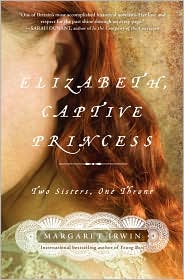 Elizabeth, Captive Princess: Two Sisters, One Throne. Margaret Irwin. 2010. Sourcebooks. 352 pages.
Elizabeth, Captive Princess: Two Sisters, One Throne. Margaret Irwin. 2010. Sourcebooks. 352 pages.
The fields were deep and ruddy with uncut corn, the orchards heavy with ripening fruit.
Elizabeth, Captive Princess is the sequel to Young Bess. It covers Elizabeth's life from the death of her brother, King Edward VI, Jane Grey's nine day reign, and the uncertain years of Mary's reign. The novel concludes with Elizabeth meeting her future brother-in-law, King Phillip II of Spain.
The focus is on politics and survival. How difficult it is for men and women to keep their heads, keep their lives, when rumors could prove deadly, when conspiracy theories abound.
The book focuses on the games people were forced to play with one another. How careful one had to be. How saying too much--or too little--could lead to imprisonment or even death. How did Elizabeth feel about her older sister Mary? Did she want the crown for herself? Did she support any of her supporters that would have preferred her to Mary? How much did she know and when did she know it? Was it more about keeping England out of Spain's hands?
It's a fictional novel that may appeal to history lovers. It held my interest--which is all that I ask.
© Becky Laney of Becky's Book Reviews
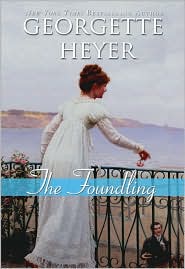
The Foundling. Georgette Heyer. 1948/2009. Sourcebooks. 439 pages.
When the young gentlemen strolling through the park with his gun on his shoulder and an elderly spaniel at his heels came within sight of the house it occurred to him that the hour must be farther advanced than he had supposed, for the sun had sunk below the great stone pile, and an autumnal mist was already creeping over the ground.
The Duke of Sale (Gilly) is twenty-four. But. He's never lived his own life, or made his own decisions. He's had an entourage for as long as he can remember. An entourage that is determined to keep him safe, healthy, and comfortable. An entourage that Gilly feels discourages his independence, his individuality. He's never known a day of freedom.
Until. His cousin Matthew shares his troubles--he is being blackmailed. And the Duke determines to "solve" this family problem all on his own. He'll do it by being nobody. Without "being" the Duke, without being the head of the family. No. He wants to see if he's capable of being a man. Of thinking and acting like a man.
Does he succeed? At over four-hundred pages, you can imagine he does. But this new freedom doesn't come without risks and challenges and mishaps. He'll pick up not one but two strangers along the way. One young man, Tom, who is foolish and prank-loving. And one young woman, Belinda, a foundling, he "rescues" from an "uncle" who doesn't have the best of intentions. Belinda will BELIEVE any man who offers her a purple dress, you see. Or a ring. She's as silly as silly can be. But Belinda is NOT the love interest of Gilly. (I was quite relieved!)
The Foundling is not my favorite Georgette Heyer. It is a bit too long. There were so many potential ending places in the last hundred pages. Places where one more paragraph could have nicely done the job. But. For whatever reason, this ending would not be rushed. I liked it, but didn't love it.
© Becky Laney of Becky's Book Reviews

Beauvallet. Georgette Heyer. 1929/2010. Sourcebooks. 301 pages.
The deck was in shambles.
Dona Dominica, the daughter of the former governor of Santiago, Don Manuel de Rada y Sylva, is on her way back to Spain--along with her dying father, when their ship the Santa Maria is boarded by English adventurers (pirates) led by the fearless El Beauvallet (Nicholas Beauvallet). The two are taken captive by Beauvallet and brought aboard his ship, Venture. But he promises--and it's not a promise without risk--to return these two safely to Spain. If anyone can land an English ship safely into a Spanish port during these hostile times it would have to be Beauvallet.
 At first Dominica hates her captor. She refuses to admit to herself that he is a little charming, a little handsome. She flirts with the other men to drive him crazy. But. Soon she has to admit that there is an attraction between them. And she's shocked to hear him boast recklessly of his honorable intentions to make her an English woman before the year is out. Since she is his captive, you might think this would be easy. Just set sail for England instead of Spain. The lady seems willing enough. But Beauvallet wants the challenge. So he keeps his promise--his first promise--both father and daughter arrive safely in Spain. Beauvallet returns to England, to his family, to his Queen.
At first Dominica hates her captor. She refuses to admit to herself that he is a little charming, a little handsome. She flirts with the other men to drive him crazy. But. Soon she has to admit that there is an attraction between them. And she's shocked to hear him boast recklessly of his honorable intentions to make her an English woman before the year is out. Since she is his captive, you might think this would be easy. Just set sail for England instead of Spain. The lady seems willing enough. But Beauvallet wants the challenge. So he keeps his promise--his first promise--both father and daughter arrive safely in Spain. Beauvallet returns to England, to his family, to his Queen.
 But Dominica has not been forgotten. And a few months later, Beauvallet is ready to pursue his lady. To woo her in Spain. With England and Spain so very, very close to war--how can an Englishman, a pirate, a dreaded pirate, safely enter Spain? He has boasted that he will find a way...
But Dominica has not been forgotten. And a few months later, Beauvallet is ready to pursue his lady. To woo her in Spain. With England and Spain so very, very close to war--how can an Englishman, a pirate, a dreaded pirate, safely enter Spain? He has boasted that he will find a way...
Meanwhile, Dominica's father dies and she is taken into her aunt's family. Her aunt!!! Oh what a character Dona Beatrice is! She's a strong, strong woman with a mind of her own. She has a way of bullying all the men in her life including her son, Don Diego. She has determined that he must marry Dominica.
Beauvallet is an exciting and dramatic historical romance set in the Elizabethan era. Beauvallet is a bold adventurer who will risk it all to win his lady love. With his faithful companion, Joshua Dimmock, by his side, Beauvallet is ready for any challenge. The book had action, adventure, drama, and romance. I enjoyed Beauvallet very much!
The opening chapters of Beauvallet definitely reminded me of The Sea Hawk, a 1940 film starring Errol Flynn.
© Becky Laney of Becky's Book Reviews
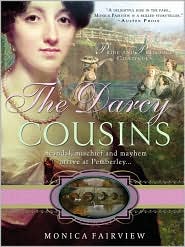
The Darcy Cousins. Monica Fairview. 2010. Sourcebooks. 432 pages.
The church door flew open and footsteps resounded through the church, forcing its lethargic inmates into sudden animation. Mr. Collins, whose sermon on fire and brimstone had taken on a decidedly monotonous rhythm, was awakened into new fervour.
What's disrupting services? The arrival of more Darcy cousins, of course! Miss Clarissa Darcy and her brother, Frederick, have come to visit their British relatives. This includes their brother Robert Darcy and his new wife, Caroline; Fitzwilliam Darcy and his wife, Elizabeth, and Miss Georgiana Darcy. But this visit happens to be taking place at Rosings! Which means readers get to see one cranky Lady Catherine and one ever-shy Anne.
Clarissa and Georgiana become great chums. Which is a good thing since both are heading to London to debut. Both hoping to have great seasons. Both hoping to find true love. But what if they were to fall for the same man?!
I really enjoyed Monica Fairview's The Other Mr. Darcy. I loved that one. And while I don't love this one quite as much as the first, I still enjoyed it a good deal. I loved Georgiana having her own story. I loved the attention to detail. I thought the characters were well done. And I love the fact that it's clean. (I have a hard time appreciating Pride and Prejudice sequels that go a bit too far.)
© Becky Laney of Becky's Book Reviews
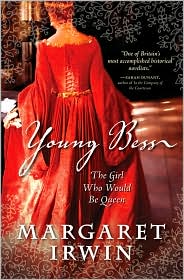
Young Bess by Margaret Irwin. 1944/2010. [March 2010] SourceBooks. 400 pages.
She had been allowed to come out to the royal flagship, and had been eating cherries and strawberries dipped in wine.
Young Bess follows the adventures and misadventures of the Tudor family. The title leads you to believe the focus is on Elizabeth and Elizabeth alone. But that isn't quite the case. It is the story of some rather turbulent years (well, most years were turbulent with the Tudors I've found!) in English history.
This book will see the death of King Henry VIII, Catherine Parr (the former Queen), Tom and Edward Seymour, and Edward VI. It stars the two Seymour brothers battling for power, a young Jane Grey, a young Elizabeth (of course), and a not-so-young Mary. Edward VI does enter into it a tiny bit. But not all that often, whether that's because he had little to do with his sisters and cousins or if he just didn't do much of anything, I don't know.
Did I like this one? Mostly. There were places where it was cleverly and amusingly written. Where it was just fun to read. There were also a few places where it was a bit boring. I did think it was well-written. And I do think fans of historical fiction will probably like it. Especially those who love to read anything and everything written about the Tudors.
There will be two others in this series.
© Becky Laney of Becky's Book Reviews
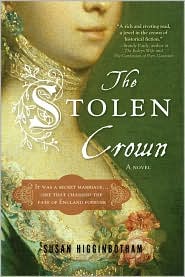
The Stolen Crown. Susan Higginbotham. 2010. [March 2010] SourceBooks. 400 pages.
You might think that the last night of a condemned traitor would be a rather solitary affair, but you would think wrong, for the last couple of hours have been bustling with people coming and going.
I know historical fiction isn't loved by everyone, isn't appreciated by everyone. I know that not every reader finds history fun. But. For the right reader, it can be very satisfying, very compelling. I really enjoyed Susan Higginbotham's The Stolen Crown. I found it to be rich in detail, yet compelling. There is a story to be told--a very dramatic one--and Higginbotham tells it well.
The Stolen Crown is the story of Harry Stafford (duke of Buckingham) and his wife Katherine Woodville (sister to Elizabeth, Queen of Edward IV). It's narrated by both Kate and Harry. It spans several decades, (1460s-1480s); these are turbulent decades in England's history. (Perhaps you haven't heard of this couple, but maybe you've heard of Richard III?!)
After having read The Tudor Rose last year, I was curious to learn more about this time period in British history. There is some overlap--when it comes to characters--and having some familiarity helped me keep everything straight in this one--but they are two very different stories.
If you're interested in history, royalty, and politics, then this one may be for you!
© Becky Laney of Becky's Book Reviews
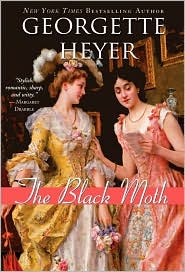
The Black Moth. Georgette Heyer. 1921/2009. Sourcebooks. 355 pages.
Prologue: Clad in his customary black and silver, with raven hair unpowdered and elaborately dressed, diamonds on his fingers and in his cravet, Hugh Tracy Clare Belmanoir, Duke of Andover, sat at the escritoire in the library of his town house, writing.
Chapter one: Chadber was the name of the host, florid of countenance, portly of person, and of manner pompous and urbane.
Loved this one. I had my doubts--I'm not sure why--but I ended up just loving it. Why did I have doubts? Well, for some reason I thought that since this was Georgette Heyer's first novel it would perhaps be clumsy or awkward. Not quite as good as the others that I've come to love. Is it her best work? Probably not. But it's good. It's fun. It's fun in a dashing kind of way.
 The characters. So many to love, so many to love to hate. Jack Carstares, Earl of Wyndam, our proper hero. Richard, his younger brother with a secret. Lavinia, Richard's wife, the woman I ended up loving to hate! Tracy, Lavinia's "devil" of a brother who thinks kidnapping is the way to get your heart's desire. Diane, the lovely woman adored by two men--one a highwayman, one a kidnapper. Miles, a good friend who has always believed in his friend no matter what. And so many more!
The characters. So many to love, so many to love to hate. Jack Carstares, Earl of Wyndam, our proper hero. Richard, his younger brother with a secret. Lavinia, Richard's wife, the woman I ended up loving to hate! Tracy, Lavinia's "devil" of a brother who thinks kidnapping is the way to get your heart's desire. Diane, the lovely woman adored by two men--one a highwayman, one a kidnapper. Miles, a good friend who has always believed in his friend no matter what. And so many more!
The writing. So much to love. It's detailed, but not in a heavy way. More in a witty kind of way. Take this description of Lavinia, "She was ever thus -- not two minutes the same." For those readers who mind the details, you'll find much to appreciate! I found it richly detailed and the world depicted by Heyer was just fascinating.
This book is loosely connected with These Old Shades.
© Becky Laney of Becky's Book Reviews
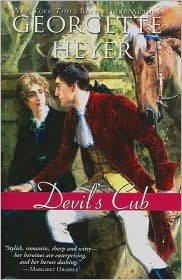
Heyer, Georgette. 1932/2009. Devil's Cub. Sourcebooks. 310 pages.
There was only one occupant of the coach, a gentleman who sprawled very much at his ease, with his legs stretched out before him, and his hands dug deep in the capacious pockets of his greatcoat.
Every Heyer book is packed with potential--with promise. Will it be the one to become my new favorite and best? Can it top the previous Heyer novels I've read? Because just when I think I've found the perfect Heyer, the one that just has to be the best one ever, I find myself falling for another hero, charmed by another great couple, or hooked by another adventure or drama.
Devil's Cub is a sequel to These Old Shades. That giddy-making couple of Justin and Leonie have an all-too-grown-up son, Dominic (aka Vidal). And boy does he have a way of getting into trouble. (Some might say he takes after his dear old dad--back before his marriage calmed him down. Though Leonie fears he takes after her--after her side of the family.) After his latest scandal, his father decides it would be best for him to leave England, to spend some time in Europe. His mother would like to see him settled down, married to a girl who can calm him down and keep him safe and happy. (If he's happily married then surely he won't be getting into so many duels. After all, he's mostly fighting men over women.)
But Vidal doesn't head to France (to Paris) alone. He plans on taking Sophia Challoner along with him. To set her up as his mistress. (Tis done there, he assures her.) He sends a letter, a note, telling her where and when to meet him. She doesn't get the note. It's intercepted by her older sister, Mary. (In poor Mary's defense, it is addressed to "Miss Challoner.) How can one sister save the other? Well, for better or worse, Mary decides to go disguised in her place. Granted, she doesn't know the destination (Paris). She thinks she'll be able (easily) to return home after her true identity is discovered. But what she doesn't know about Vidal could fill a book.
How will he react to this trick? Can Mary hold her own?
I love, love, loved this book. Granted, I didn't love everything about this one. There is one scene in particular that I didn't care for at all. (One scene that made me very uncomfortable--SPOILER--a scene where Vidal wants to show his strength to Mary--pointing out how easy it would be for him to do her harm.) But for the most part, I really enjoyed this one. It wasn't so much Mary-and-Dominic that I loved so much as the whole package. All the characters (about half of these were carried over from These Old Shades) that make this one work really well. I loved how everything came together at the end. It was oh-so-satisfying.
I mentioned that These Old Shades is my mom's favorite book. Well, I think Devil's Cub might end up being mine. At least for now.
© Becky Laney of Becky's Book Reviews
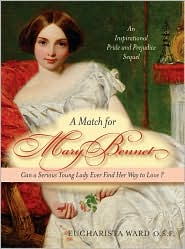
Ward, Eucharista. OS.F. 2009. A Match for Mary Bennet. SourceBooks. 350 pages.
Prologue: One might say that using the divine gift of human memory for the recitation of three-month-old annoyances represents talent misspent. Mary Bennet thought, as she sat with her hand poised over the silver tea urn, that not even all four evangelists together had documented Jesus's public life as thoroughly as her mother insisted on recounting Mary's social life.
How do you feel about Mary Bennet? Do you think she's doomed to be an old maid? A stuffy old maid at that? Or do you think there's hope for such a bookish soul?
I really enjoyed Eucharista Ward's novel. She does a great job at fleshing out Mary's character. Of showing that there is much more going on than we've been led to believe. She does a good job with all the familiar characters really. Lydia. Kitty. Elizabeth. Jane. Georgiana. Mrs. Bennet. She also introduces readers to new characters, men like Mr. Stilton, Mr. Grantley, and Mr. Oliver. Which of these men (if any) will Mary choose to settle down with? Will it be a love match?
It's been several years since Jane won her Charles, and Elizabeth her Darcy. Is it Mary's turn for love?
What did I enjoy about this one? Mary. Yes, books matter to her. And music. And God. She takes her faith seriously. But she is a human character. She's not as stiff and unfeeling, as cold and closed-off as you might think. And I love seeing her side of things.
© Becky Laney of Becky's Book Reviews
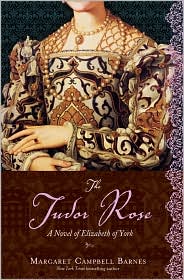
Barnes, Margaret Campbell. 1953/2009. The Tudor Rose: A Novel of Elizabeth of York. Sourcebooks. 336 pages.
A long-drawn sigh of feminine ecstasy filled the room as the white velvet was lifted from its wrappings.
This is my third Margaret Campbell Barnes, and I absolutely loved it. Okay, maybe absolutely is putting it a little too strongly. After all, I'm not saying this is the most wonderful, amazing book ever written. What is it about? Elizabeth of York? Who is she? She's the daughter of Edward the IV. The sister of the two (supposedly) murdered princes. The niece of Richard III. The wife of Henry VII. The mother of Henry VIII. (You can read my thoughts on Shakespeare's Richard III.) This one novel spans many decades. We first see Elizabeth as a young woman, a girl preparing for a wedding, the "feminine sighs of ecstasy" are nothing improper, rather her reaction to trying on her wedding gown. (The engagement falls through, however.) We see her taking delight in being a daughter, a sister. We see a brief glimpse of the before. Before what? Well, before everything fell apart and then some. Before her father dies. Before her younger brother becomes the king. Before her brothers lives are at risk from someone very close at hand.
This story could not be told without focusing in on the politics. What things people will do (and say) for a chance at absolute power and control. The novel reveals a personal story. How these power plays, these political manipulations can control one's life. Because of who she is--whose daughter she is--many things are out of her control. It's not a matter of who she loves, who she desires, what she wants, what she needs, what kind of life she'd like to have. Reading this one made me see the human side of history.
The book was compelling. In fact, I had a hard time putting it down. I didn't expect that. I didn't expect a must-read feeling. I didn't expect to find such an instant connection with these characters. I didn't expect such a strong reaction. I find it interesting that even though I knew what would happen, it was so suspenseful, that I had to keep reading. I didn't find it boring...at all. So I would definitely recommend this one to fans of historical fiction. If you haven't discovered Margaret Campbell Barnes, you should really give her a try.
© Becky Laney of Becky's Book Reviews

Heyer, Georgette. 1940/2009. The Corinthian. Sourcebooks. 261 pages.
The Corinthian is one of the funner Georgette Heyer novels I've read in recent months. Heyer is great at writing romantic comedies. True, Heyer isn't always the most original author, her books often follow a handful of different patterns. But they're patterns that work time and again. And there's the difference, in my opinion. There is something satisfying and delightful about her books, her characters. So some plot devices are familiar, that doesn't mean the stories and characters themselves are stale and uninteresting. Far from it actually. Her characters are ones that you want to spend time with.
In The Corinthian, we've got a bachelor, Sir Richard Wyndham, who happens to rescue a damsel in distress, Penelope Creed. Penelope set on running away from her aunt--who is encouraging her into a loveless marriage with her cousin Fred--is disguised as a boy. Richard, while on his way home and a bit drunk at that, sees Pen climbing out her window--by way of her bed sheets of course. He "catches" her just in time. Granted, this "she" is dressed as a he. But there's no fooling Richard. A bit amused at the situation, and wanting to run away himself to avoid an unpleasant appointment the next day, he decides to help out. She wants to escape London--and her aunt--and travel to Bristol (or near Bristol anyway). She's got a childhood friend, Piers, who she fancies herself madly in love with. Five (or so) years ago, these two promised themselves to each other. Hearing this tale, Richard decides to join in the journey and ensure her safety. The two will go together. He will act as her tutor-uncle-cousin and 'protect' her along the way. (Each identity is used on their journey at various stages.) Their journey is rarely boring--they get in and out of trouble along the way.
This one is playful and fun. There's some adventure thrown in as well--and a murder!--but at it's heart this is a romantic comedy.
© Becky Laney of Becky's Book Reviews

Higginbotham, Susan. 2009. The Traitor's Wife. Sourcebooks. 500 pages.
The good, the bad, the ugly. The Traitor's Wife did hold my interest. I was expecting--in a way--to find it a bit dry and, well, boring. But that is far from the case. I also assumed it would be a tricky book, one that would be so complex that I couldn't keep the characters straight. I didn't find that true either. It was way more accessible than I assumed it would be.
The Traitor's Wife is set during a time period that I am largely unfamiliar with: the reign of several Edwards. (Edward I, Edward II, and Edward III) The novel ranges several decades: 1306 to 1337. These were very turbulent years. And reading about the politics of the day only reaffirmed my belief that I'd never, ever, ever want to have lived back then. I suppose the better way to phrase it would be that I can't understand this thirst for power that would prompt people to WANT to raise themselves up and gamble their lives by interacting with the royal court and politicians.
Our heroine, Eleanor, doesn't have much choice being born into the royal family. Her grandfather is Edward I, king, and her uncle is Edward II. (Of course, she's also related to Edward II's son, Edward III.) She is the wife of Hugh le Despenser. Hugh, when we first meet him, seems a little distant from politics. It seems that the royal court is far removed from his concerns. His wife, Eleanor, is a lady in Queen Isabella's court. He seems more annoyed that his wife can't be a full-time wife and mother than pleased that she is a favorite of the current king and queen. But this doesn't last. Sadly.
Because Hugh becomes power-hungry. He becomes obsessed with getting what he wants. Having the best land, the most land. Accumulating wealth. Bossing others around. How does he get this power? He becomes the king's bedfellow. Being intimate with the king seems to give Hugh everything he ever wanted out of life. But this choice leads to several problems. For one, his gimme gimme attitude makes everyone at court (excepting the king and his wife) hate him. He has enemies. And every week, he gets more and more and more. Soon almost everyone hates him and begins demanding his exile and/or death.
Eleanor is no saint. She isn't a heroine that I entirely sympathized with. None of the characters were really. But while I may not have *loved* the characters, I was always ever fascinated by their choices. (Though almost always I disagreed with them.) It was interesting to see what choices people had, what choices women had especially. (Which, as you might have guessed, was almost nil.)
© Becky Laney of Becky's Book Reviews
If you're reading this post on another site, or another feed, the content has been stolen.







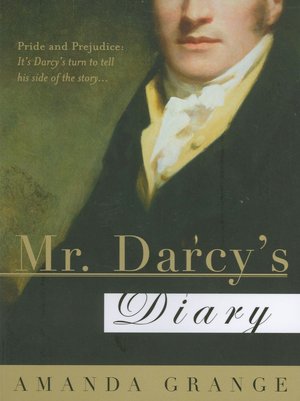
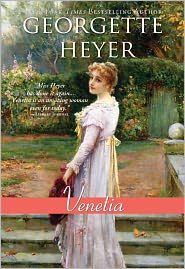




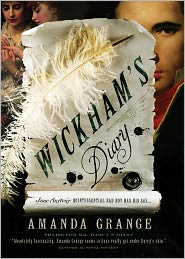
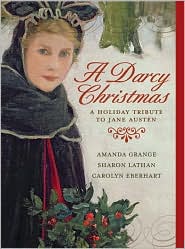


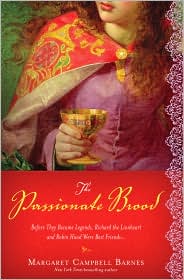















Online store of romantic love stories. Read popular romantic book published by Harlequin.
Remarkable issues here. I’m very satisfied to peer your article. Thank you so much and I am having a look forward to touch you. Will you please drop me a mail?
Teacher lesson Plans